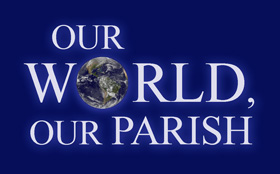Key points:
- Big changes for The United Methodist Church, including regionalization, could come at the General Conference set for April 23 to May 3.
- This will likely be the last General Conference with a majority of U.S. delegates.
- The United Methodist Church and its ecumenical Methodist partners face the challenge of shifting from centuries of U.S. dominance and the opportunity to reflect better the multinational, multicultural nature of the church universal.
- The term “intercultural connectionalism” recognizes that the connections that make up The United Methodist Church and its ecumenical partners cross lines of culture and other elements of difference.


Photo © Hector Amador.
Commentaries
As 2024 begins, many United Methodists are looking toward the next General Conference, to be held April 23-May 3. This legislative gathering has the potential to make significant changes to The United Methodist Church through regionalization and other proposals.
Whatever happens at this General Conference, it will be historic. For over 240 years, General Conference has always had a majority of U.S. delegates; however, 2024 is very likely to be the last time a regular General Conference will have a majority of delegates from the United States.
The upcoming shift in delegates reflects a shift in membership in The United Methodist Church. Even before the recent wave of local church disaffiliations, membership decline in the United States and membership growth in Africa meant that more United Methodists have been living outside the United States than in it for the past several years. This membership shift coincides with a season in which United Methodists are seeking to reexamine and revitalize relationships with ecumenical partner Methodist churches throughout the world.
These changes present United Methodists and their ecumenical Methodist partners with a challenge and an opportunity. The challenge is to shift from centuries of U.S.-dominance in the church. The opportunity is to reflect better the multinational, multicultural nature of the church universal. Multiculturalism has been part of the church since its beginning in Acts 2 and will continue to be part of the church in heaven, according to Revelation 7:9-10.
For the church to avail itself of the divine opportunities of being a multinational, multicultural church, it will need to engage in both deconstructive and constructive work.
The deconstructive work involves letting go of the presumption that the church should revolve primarily around Americans and their values, concerns and standards, and dismantling or reconfiguring the structures that solidify that presumption.
This work is underway throughout the church, often carried out under the term “decolonizing church.” One example of such work is the book of essays I have edited with Filipe Maia, “Methodism and American Empire: Reflections on Decolonizing the Church.”
The bishops’ initiative over the past several years to “dismantle racism” is a related endeavor, and many other scholars, agencies and church leaders are involved in such efforts as well.
The constructive work necessary for becoming a truly multinational, multicultural church is for the church to increase its capacity to communicate and work across cultures and contexts. Communicating and collaborating across cultures requires not just intellectual commitment to the importance of being a worldwide church. It requires specific skills in listening, seeking understanding, being flexible and adapting.
Again, this work is being carried out in many spots throughout the denomination. One such effort that I am involved in is a joint theological task force between the United Methodist boards of Global Ministries and Higher Education and Ministry. Joining me in that work are the Rev. Dr. Greg Bergquist, Dr. David Field, the Rev. Dr. Paulo Roberto Garcia, the Rev. Dr. Jean Claude Maleka, Deaconess Darlene Marquez-Caramanzana, the Rev. Dr. Connie Semy Mella, Dr. Amos Nascimento, Dr. Hendrik R. Pieterse and Dr. Ulrike Schuler.
This task force was convened to reflect on theological grounds for greater collaboration between the two agencies. One of the major insights from our joint reflection is a concept we are calling “intercultural connectionalism.”
The term “intercultural connectionalism” builds on the Methodist tradition of connectionalism as a central ecclesiological concept. I have written about connectionalism elsewhere, but briefly it refers to the structures, practices, relationships and theology that connect local congregations to one another, in the process creating something that is greater than the sum of its parts.
Adding the term “intercultural” recognizes that the connections that make up The United Methodist Church (and its ecumenical partners) cross lines of culture and other elements of difference. Intercultural connectionalism thus offers a factual description of the current nature of The United Methodist Church. (And much of its history, too, if we have eyes to see it — as in, for instance, this article.) It also offers a normative aspiration — that the church will learn to connect in ways that take cultural differences seriously.
Indeed, to push the claim further, we cannot truly understand the nature of United Methodist connectionalism unless we consider various cultural perspectives on the concept. I have written elsewhere about how the understanding of what a denomination is varies across contexts and how European and Filipino United Methodists have unique perspectives on the nature and meaning of connectionalism.
Thus, intercultural connectionalism involves a different approach to theological reflection in and for the denomination. It requires that United Methodists engage in intercultural dialogue as we seek to understand the nature of our church and how God is calling us to join in God’s mission around the world.
While General Conference does provide a venue to engage in intercultural dialogue, United Methodists should avoid associating intercultural connectionalism only with General Conference. Although it brings together United Methodists from around the world, General Conference, because of its limited time frame and legislative focus, may not always be the best place for United Methodists to engage in deep listening and learning across cultures.
Instead, it is better to think of intercultural connectionalism as a principle that various parts of the denomination can incorporate into their practices. This includes the general agencies, the Council of Bishops, the ecumenical office, the Commission on Faith and Order, scholarly networks and mission partnerships. Whenever United Methodists from varying cultural backgrounds gather, attention should be paid to how those cultural backgrounds inform their understanding of United Methodism and what they can learn from one another.
The Global Ministries/Higher Education theological task force has developed a discussion guide to help United Methodists and their ecumenical Methodist partners engage in conversations related to intercultural connectionalism. The study guide, which is available in English, French, Portuguese, Spanish and German, moves from reflections about our Wesleyan origins through our history to our hopes for healing and renewal and the actions inspired by those hopes. The four-session discussion guide can be used in various settings, from the local church to seminaries to connectional bodies.
Subscribe to our
e-newsletter
The guide ends with questions about how we can act as United Methodists. This is significant, because while conversation and conferencing are important realms in which to live out intercultural connectionalism, intercultural connectionalism must also characterize our joint work in the world. United Methodists have always had a strong sense that one’s faith must be lived out. Living out our faith with others from different cultural backgrounds, as together we engage in mission and ministry, presents new opportunities to learn from one another.
In this regard, United Methodists can learn from Interfaith Youth Core and other interfaith organizations which have concluded that generating understanding across differences should involve not just talking about those differences but also joining together in positive work in the world. Such joint work builds understanding and relationships. As I have argued elsewhere, relationships are a vital component of connectionalism, necessary to make organizational connectionalism work.
The Global Ministries/Higher Education task force, and the increased alignment between the two agencies broadly, including sharing a general secretary, represents a further opportunity here. Not only is education an important part of mission around the world, but this interagency collaboration is also a chance to bring scholarly conversation about intercultural connectionalism and the application of intercultural connectionalism in mission practice together.
Alignment between the two agencies creates possibilities for deeper learning about and better practice of intercultural connectionalism.
United Methodists are part of a multicultural church that is tied to partner Methodist churches from yet more cultural backgrounds. This has long been true and will only become truer in the future. For the church to embrace this blessing from God, we must live into the reality and the opportunity of intercultural connectionalism.
Scott is the director of mission theology in the Office of the General Secretary at United Methodist Global Ministries.
News media contact: Tim Tanton or Joey Butler at (615) 742-5470 or newsdesk@umcom.org. To read more United Methodist news, subscribe to the free Daily or Weekly Digests.


